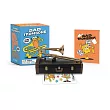Demonstrating how Chaucer uses the Bible in The Canterbury Tales as an authoritative literary source and model for his own literary production, this book explores the ways in which the Bible was a key tool for Chaucer’s self-definition and innovation as an author.
Chad Schrock unravels Chaucer’s Tales in the light of topics important to biblical reception in 14th-century England: authority, textuality, interpretation, translation, rephrasing and marginalia. When the Canterbury Tales are summed up in this way, they show the great extent to which Chaucer was drawing upon the Bible as a meta-poetical resource for his own poetry - its fictional tale-tellers and characters, its quotations, allusions and images, its plots, its imaginative engagement with an audience of listeners and readers, and its hidden intentions.
Schrock demonstrates that the Bible is a uniquely potent literary source for Chaucer because it combines infinite authority and plenitude with unprecedented freedom of interpretive invention. As a world-making text, the Bible’s authority includes the literary as subcategory but surpasses and contextualizes it, which gives Chaucer’s deferential biblical invention a different kind of freedom and safety. Within Chaucer’s tales, a biblical image is often where a given narrative peaks and its plot comes clear, but a biblical world also and without strain contains his biblical fictioneers and whatever they make from the Bible, whether orthodoxy or heresy, whether sin or worship.



 天天爆殺
天天爆殺  今日66折
今日66折 

























 博客來
博客來 博客來
博客來 博客來
博客來 博客來
博客來 博客來
博客來